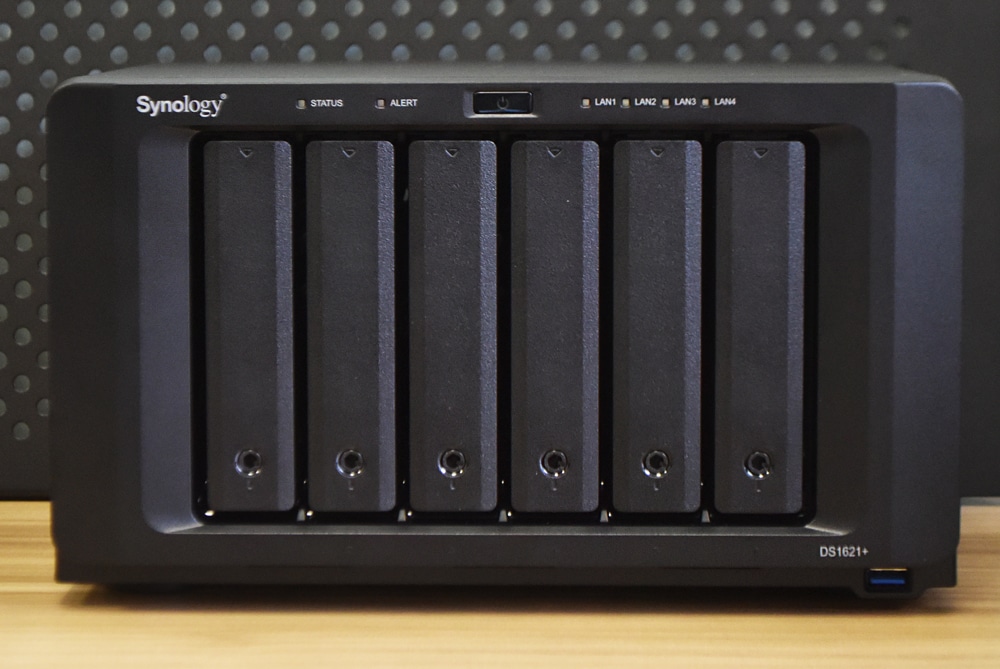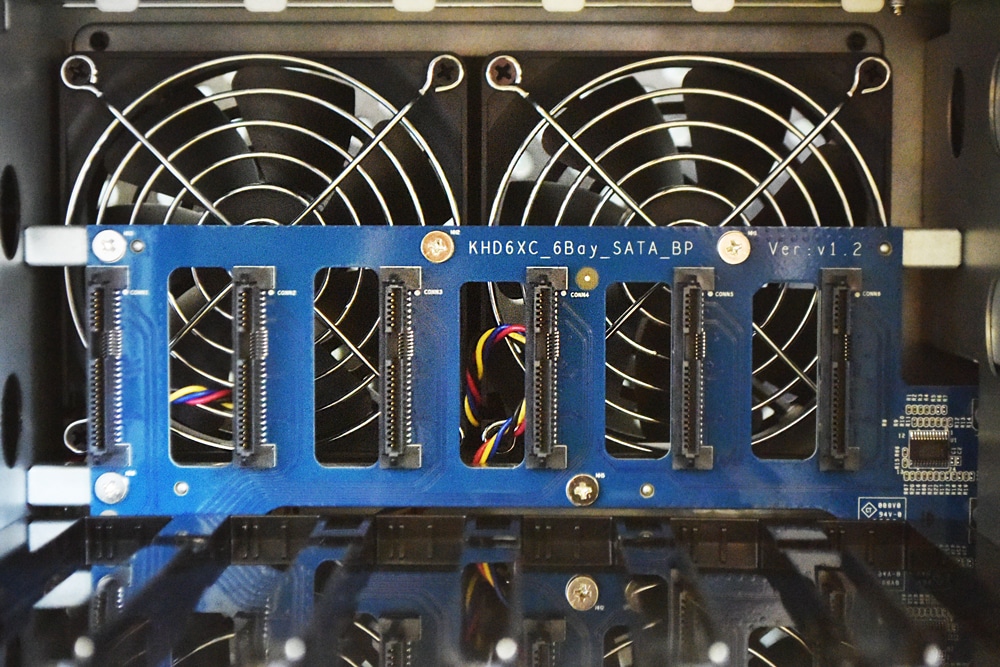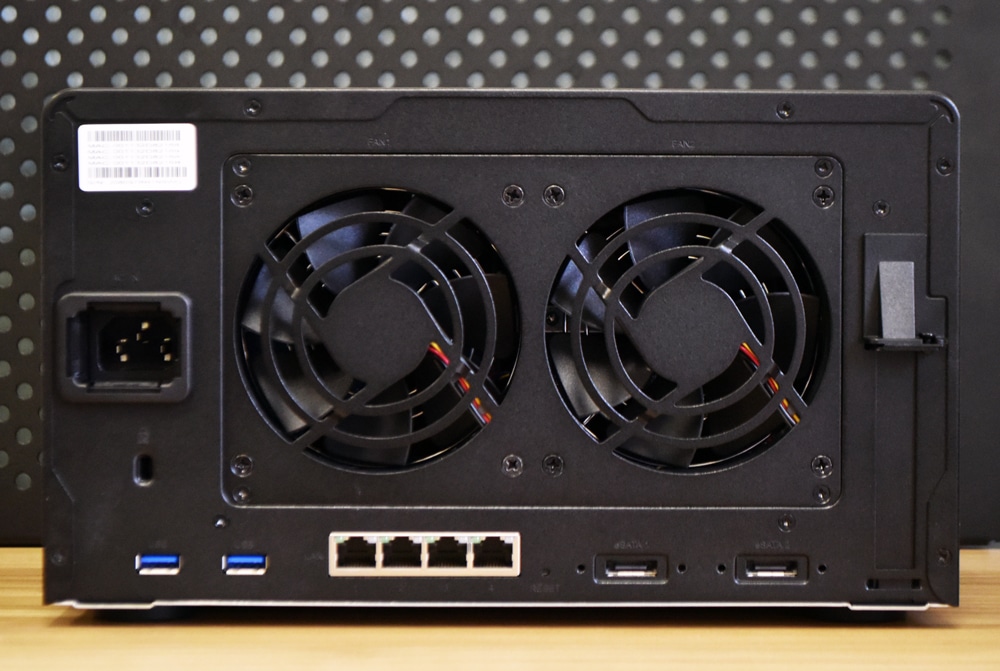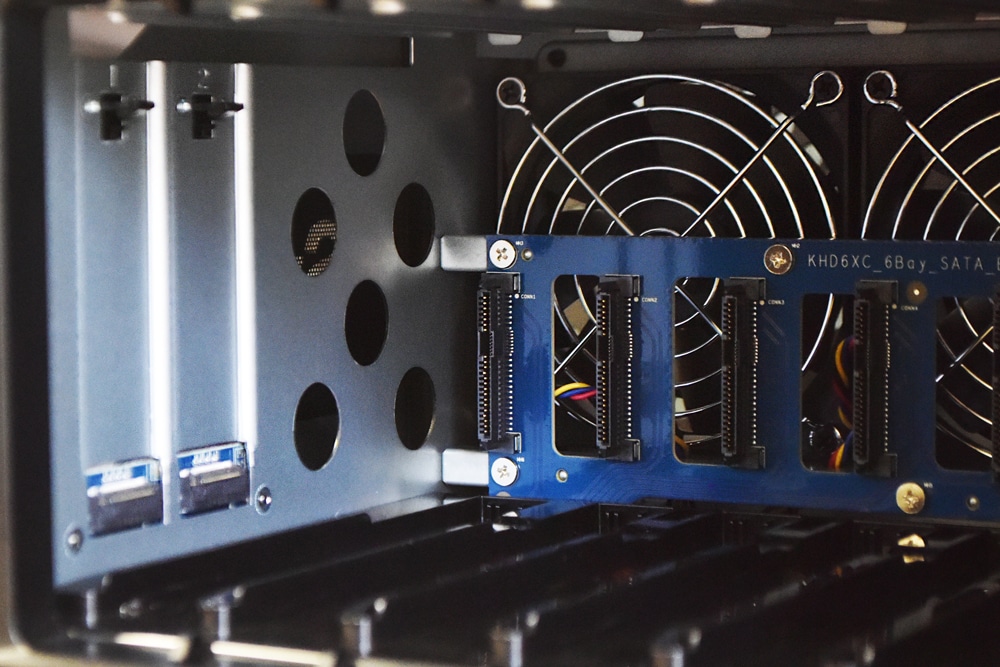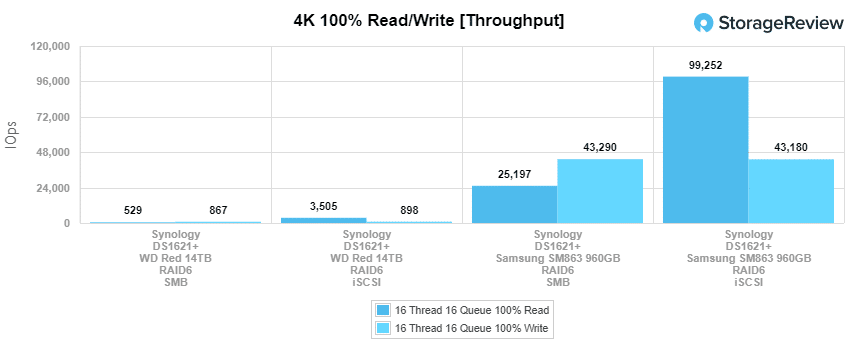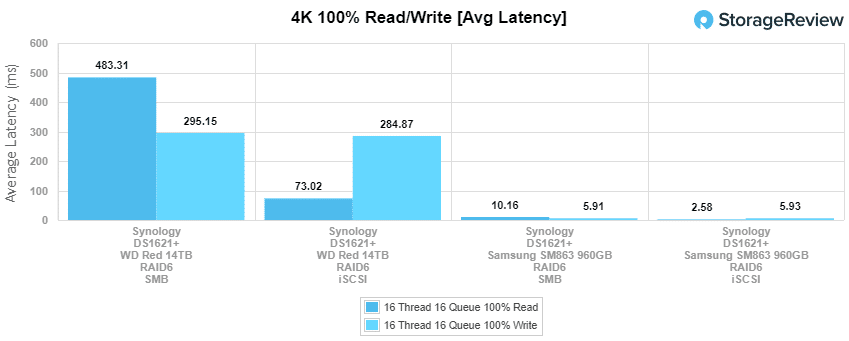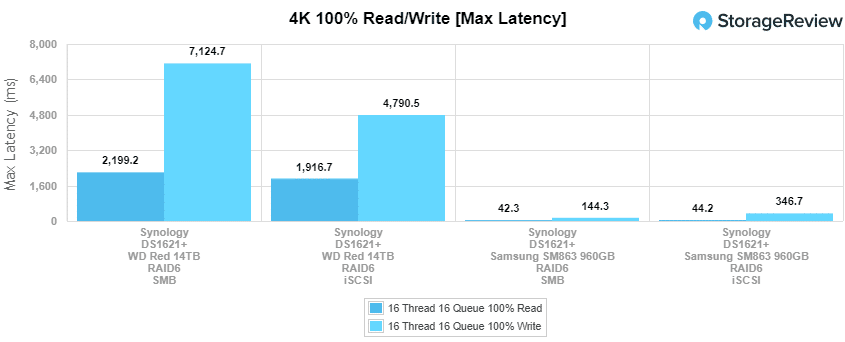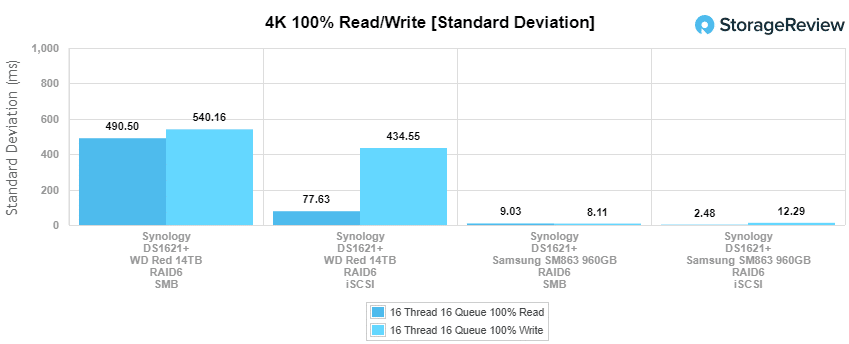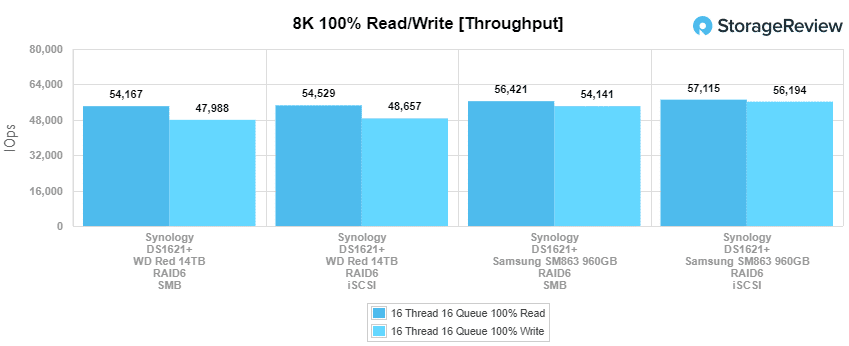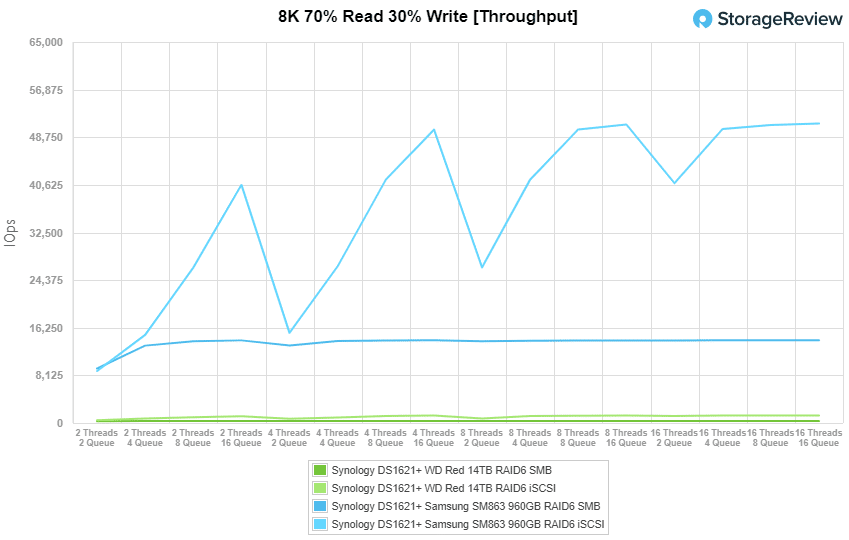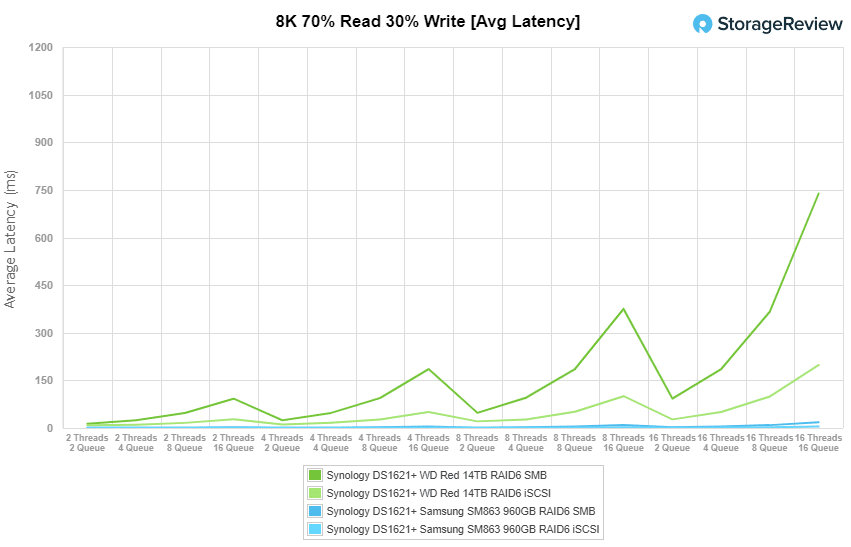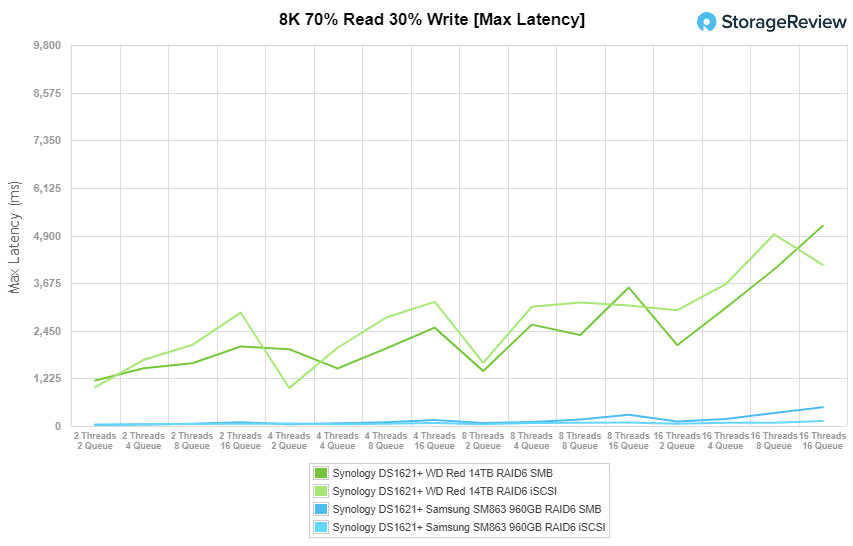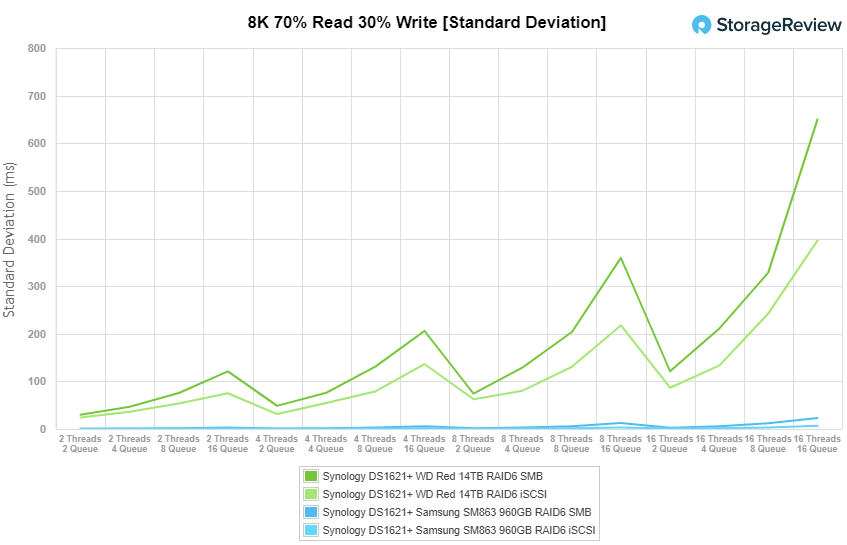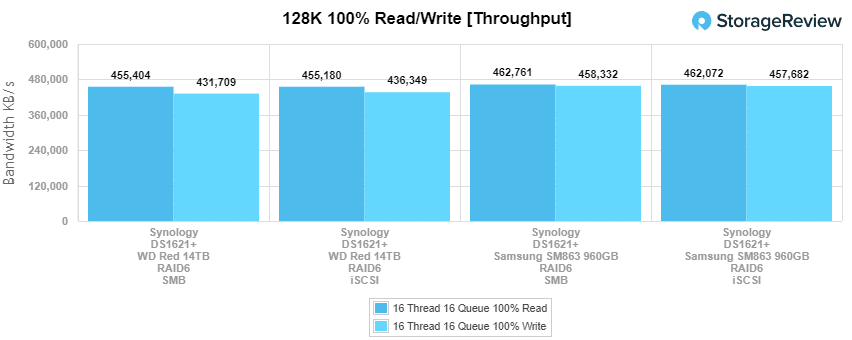The Synology DiskStation DS1621+ is a compact, power-driven NAS designed to give smaller businesses an effective way to store and protect their important data. This 6-bay NAS solution features an AMD Ryzen CPU and two M.2 2280 slots for NVMe Cache to highlight its focus on performance. It also can be equipped with two DX517 expansion units, which allows users to expand as their data requirements grow with up to 16 drives for a maximum capacity of 108TB.
The Synology DiskStation DS1621+ is a compact, power-driven NAS designed to give smaller businesses an effective way to store and protect their important data. This 6-bay NAS solution features an AMD Ryzen CPU and two M.2 2280 slots for NVMe Cache to highlight its focus on performance. It also can be equipped with two DX517 expansion units, which allows users to expand as their data requirements grow with up to 16 drives for a maximum capacity of 108TB.
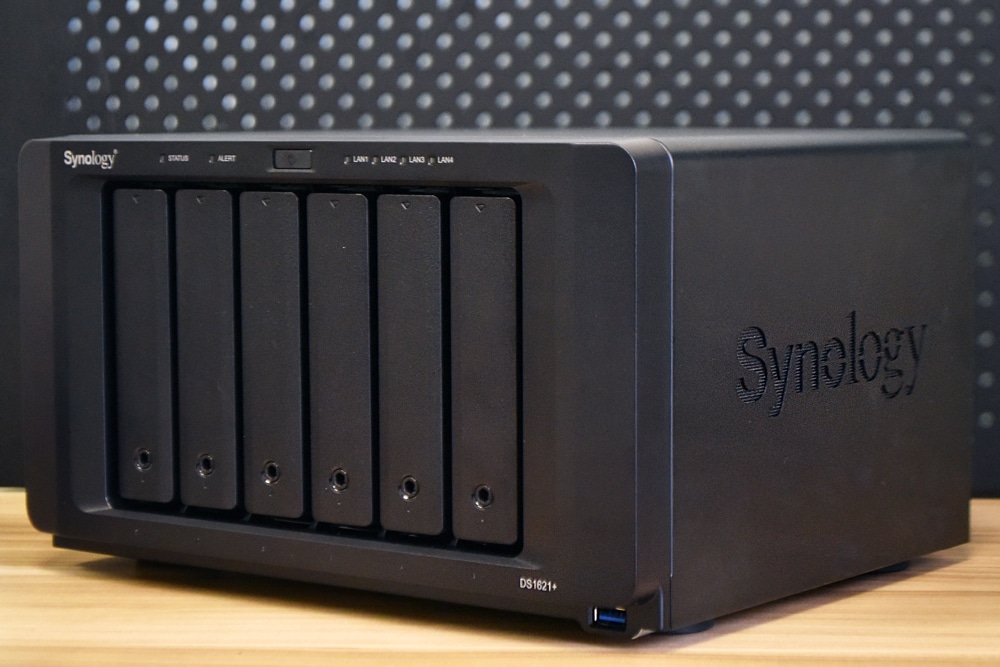 Performance-wise, Synology quotes around 2.3GB/s read and 1.13GB/s write in sequential speeds using (when using Aggregated 10GbE SMB), while random speeds are expected to reach up to 110,000 IOPS read and 55,000 IOPS write (when using 10GbE iSCSI). To help achieve these speeds, the DS1621+ comes equipped with an AMD Ryzen V1500B 4-core 64-bit CPU at 2.2 GHz, which features Hardware Encryption Engine (AES-NI). When enabled, speeds will slow down a bit due to the encryption process. The DS1621+ also can be outfitted with up to 32GB DDR4 ECC SODIMM RAM (though only 4GB comes standard).
Performance-wise, Synology quotes around 2.3GB/s read and 1.13GB/s write in sequential speeds using (when using Aggregated 10GbE SMB), while random speeds are expected to reach up to 110,000 IOPS read and 55,000 IOPS write (when using 10GbE iSCSI). To help achieve these speeds, the DS1621+ comes equipped with an AMD Ryzen V1500B 4-core 64-bit CPU at 2.2 GHz, which features Hardware Encryption Engine (AES-NI). When enabled, speeds will slow down a bit due to the encryption process. The DS1621+ also can be outfitted with up to 32GB DDR4 ECC SODIMM RAM (though only 4GB comes standard).
For connectivity, the Synology NAS is equipped with four RJ-45 1GbE LAN ports, three USB 3.2 Gen 1 ports, and two eSATA ports. If organizations need to more, they can build on the functionality of the DS1621+ via its PCIe Gen3 x8 slot (x4 link). This allows them to add components like a 10GbE network adapter card or another M.2 NVMe drive slot to significantly boost performance.
The DS1621 line also comes in an xs model. One of the major differences between the two units is the CPU, as the DS1621xs+ is equipped with an Intel Xeon D-1527 4-core 2.2GHz (Turbo Boost up to 2.7GHz) compared to the DS1621+’s AMD CPU mentioned above. The DS1621xs+ also comes equipped with a 10GbE port, while the DS1621+ only features 1GbE. In addition, the base xs model comes with 8GB of RAM versus the 4GB of the DS1621+ (though both can be expanded up to 32GB) and has a larger maximum single volume size of 200 TB (this build requires 32GB of RAM and works with RAID 5 or RAID 6 groups only). These differences make the DS1621+ the much more affordable one of the two.
Like all Synology devices, the DS1621+ features the highly versatile Synology DiskStation Manager (DSM). This NAS operating system manages all aspects of the device and provides users with a range of applications to fit virtually any need or use case. For example, the Central Management System allows organizations to manage all their Synology NAS devices from a centralized console, while Synology High Availability provides a smooth transition between clusters servers when an unexpected failure occurs.
Backed by a 3-year warranty, the Synology DiskStation DS1621+ goes for roughly $800 for the diskless model.
Synology DiskStation DS1621+ Specifications
| CPU | AMD Ryzen V1500B
CPU Architecture: 64-bit CPU Frequency: 4-core 2.2 GHz Hardware Encryption Engine: (AES-NI) |
| Memory | |
| System Memory | 4 GB DDR4 ECC SODIMM |
| Memory Module Pre-installed | 4 GB (4 GB x 1) |
| Total Memory Slots | 2 |
| Maximum Memory Capacity | 32 GB (16 GB x 2) |
| Storage | |
| Drive Bays | 6 |
| Maximum Drive Bays with Expansion Unit | 16 (DX517 x 2) |
| M.2 Drive Slots | 2 (NVMe) |
| Compatible Drive Type |
|
| Maximum Single Volume Size | 108 TB |
| Hot-Swappable Drive | Yes |
| External Ports | |
| RJ-45 1GbE LAN Port | 4 (with Link Aggregation / Failover support) |
| USB 3.2 Gen 1 Port | 3 |
| eSATA Port | 2 |
| PCIe | |
| PCIe Expansion | 1 x Gen3 x8 slot (x4 link) |
| File System | |
| Internal Drives |
|
| External Drives |
|
| Appearance | |
| Size (Height x Width x Depth) | 166 mm x 282 mm x 243 mm |
| Weight | 5.1 kg |
| Others | |
| System Fan | 92 mm x 92 mm x 2 pcs |
| Fan Speed Mode |
|
| Easy Replacement System Fan | Yes |
| Brightness Adjustable Front LED Indicators | Yes |
| Power Recovery | Yes |
| Noise Level | Yes |
| Scheduled Power On / Off | Yes |
| Wake on LAN / WAN | Yes |
| Power Supply Unit / Adapter | Yes |
| AC Input Power Voltage | Yes |
| Power Frequency | Yes |
| Power Consumption | Yes |
| British Thermal Unit | Yes |
| Environment | RoHS Compliant |
| Packaging Content |
|
| Warranty | 3 Years |
Synology DiskStation DS1621+ Design and Build
The Synology DiskStation DS1621+ features the exact same as the xs model (though it does weigh slightly less) and just like the rest of the company’s NAS tower lineup. As such, it has nice matte black chassis that combines both metal and plastic.
On the front is the 3.5” drive bays, which feature a locking mechanism and a drive status indicator LED at the top. Along the top from left to right are the status and alert indicators, the power button, and the LAN indicator lights. In addition, one of the USB 3.0 ports is located in the bottom right corner.
On the back panel, you will see the two fans that take up most of the space. Surrounding the fans is the port to the left and the PCIe expansions slot to the right. Along the bottom are two USB 3.0 ports, the four RJ-45 1GbE LAN ports, a reset button, and two expansion ports.
The M.2 cache can be found inside of NAS on the left side of the furthest drive bay.
Enterprise Synthetic Workload Analysis
Our enterprise shared storage and hard drive benchmark process preconditions each drive into steady-state with the same workload the device will be tested with under a heavy load of 16 threads with an outstanding queue of 16 per thread, and then tested in set intervals in multiple thread/queue depth profiles to show performance under light and heavy usage. Since hard drives reach their rated performance level very quickly, we only graph out the main sections of each test.
Preconditioning and Primary Steady-State Tests:
- Throughput (Read+Write IOPS Aggregate)
- Average Latency (Read+Write Latency Averaged Together)
- Max Latency (Peak Read or Write Latency)
- Latency Standard Deviation (Read+Write Standard Deviation Averaged Together)
Our Enterprise Synthetic Workload Analysis includes four profiles based on real-world tasks. These profiles have been developed to make it easier to compare to our past benchmarks as well as widely-published values such as max 4k read and write speed and 8k 70/30, which is commonly used for enterprise drives.
- 4K
-
- 100% Read or 100% Write
- 100% 4K
- 8K 70/30
- 70% Read, 30% Write
- 100% 8K
- 8K (Sequential)
- 100% Read or 100% Write
- 100% 8K
- 128K (Sequential)
- 100% Read or 100% Write
- 100% 128K
For our testing, we configured the Synology DiskStation in RAID6 in both iSCSI and SMB using both an HDD and SSD configuration using the following drive:
- 6 x WD Red NAS HDD (14TB)
- 6 x Samsung SM863 SSD (960GB)
In the first of our enterprise workloads, we measured a long sample of random 4K performance with 100% write and 100% read activity. Looking at IOPS, the Synology DiskStation DS1621+ showed a performance of 867 IOPS write and 529 IOPS read in SMB and 898 IOPS write, and 3,505 IOPS read in iSCSI using HDDs. With SSDs, the number showed an expected drastic improvement, showing 43,290 IOPS write and 25,197 IOPS read in SMB and 43,180 46 IOPS write and 99,252 IOPS read in iSCSI.
In 4K average latency (where lower is better), the Synology DS1621+ hit 295.2ms write and 483.3ms read in SMB and 284.8ms write and a much lower 73.0ms read in iSCSI (HDD configuration). With SSDs, the latency fell to 5.91ms and 10.16ms write/read in SMB and 5.93ms and 2.58ms write/read in iSCSI.
Switching over to 4K max latency, the DS1621+ showed a performance of 7,124.7ms write and 2,199.2ms read in SMB and 4,790.5ms write and 1,916.7ms read in iSCSI. In our SSD configuration, the Synology NAS showed figures of 144.25ms write and 42.33ms read in SMB and 346.72ms write and 44.16ms read in iSCSI.
For our last 4K test, we looked at standard deviation. Here, we saw performance figures of 540.16ms write and 490.5ms read in SMB and 434.6ms write and 77.6ms read in iSCSI (HDDs). With our SSD configuration, performance increased to 8.1ms read and 9.03ms write in SMB and 12.29ms write and 2.48ms read in iSCSI.
Our next benchmark measures 100% 8K sequential throughput with a 16T16Q load in 100% read and 100% write operations. Here, the DS1621+ was able to hit 47,988 IOPS write and 54,167 IOPS read in SMB and 48,657 IOPS write, and 54,529 IOPS read in iSCSI. With SSDs, the NAS showed a slight improvement with 54,141 IOPS write and 56,421 IOPS read in SMB. In our iSCSI SSD configuration, we saw the best performance with writes and reads of 56,194 IOPS and 57,115 IOPS, respectively.
Compared to the fixed 16 thread, 16 queue max workload we performed in the 100% 4K write test, our mixed workload profiles scale the performance across a wide range of thread/queue combinations. In these tests, we span workload intensity from 2 thread/2 queue up to 16 thread/16 queue. With throughput, SMB posted a range of 302 IOPS to 346 IOPS while iSCSI hit a range of 481 IOPS to 1,290 IOPS when using HDDs. In our SSD configuration, iSCSI was by far the best with 8,873 IOPS at 2T/2Q and finishing off at 51,101 IOPS at 16T/16Q.
Looking at average latency performance figures in our SSD configuration, our HDD configuration showed a range of 13.16ms to 738.46ms in SMB, while iSCSI recorded 8.28ms to 198.33ms. Using SSDs, the Synology DS1621+ showed 0.42ms to 18.1ms in SMB while iSCSI recorded 0.44ms to 5ms.
For maximum latency in our HDD configuration, we saw 1,170.43ms to 5,147.56ms in SMB and 998.52ms to 4,144.79ms in iSCSI, while our SSD configuration posted scores of 28.01ms to 479.85ms and 40.18ms to 129.84ms in SMB and iSCSI, respectively.
Looking at standard deviation in our HDD configuration, the DS1621+ posted results of 29.92ms to 650.1ms in SMB and 24.01ms to 395.19ms in iSCSI, while our SDD configuration posted scores of 0.43ms to 23.07ms (SMB) and 0.37ms to 6.84ms (iSCSI).
The last Enterprise Synthetic Workload benchmark is our 128K test, which is a large-block sequential test that shows the highest sequential transfer speed for a device. In this workload scenario, the HDD DS1621+ configuration had 431.7MB/s write and 455.4MB/s read in SMB and 436.3MB/s write and 455.2MB/s read in iSCSI. With SSDs, the performance saw a slight increase in both SMB and iSCSI, showing 458.3MB/s write and 462.8MB/s read and 457.7MB/s read and 462.1MB/s write, respectively.
Conclusion
The Synology DiskStation DS1621+ is a compact 6-bay NAS built to easily handle most small business needs with its solid performance. This affordable DiskStation is highlighted supports up to two DX517 expansion units, which increases the number of available drive bays to 16 for a maximum capacity of 108TB. Other hardware features include an AMD Ryzen V1500B 4-core 64-bit CPU at 2.2 GHz, up to 32GB DDR4 ECC SODIMM (standard models ship with 4GB), dual M.2 2280 NVMe SSD bays for caching, and four 1GbE ports.
To gauge its performance, we configured the NAS in both HDD (WD Red 14TB drives) and SSD (Samsung SM863 960GB) builds using both iSCSI and SMB connectivity. First up is our HDD tests. During our 100% read/write random 4K test, the DS1621+ showed IOPS write and 529 IOPS read in SMB and 898 IOPS write and 3,505 IOPS read in iSCSI with average latencies of 295.2ms write and 483.3ms read in SMB and 284.8ms write and a much lower 73.0ms read in iSCSI. 8K sequential was able to hit 47,988 IOPS write and 54,167 IOPS read in SMB and 48,657 IOPS write and 54,529 IOPS read in iSCSI. 128K Large Block HDD results recorded 431.7MB/s write and 455.4MB/s read in SMB and 436.3MB/s write and 455.2MB/s read in iSCSI.
Our DS1621+ SSD configuration, as expected, recorded much better performance. In 4K, we saw 43,290 IOPS write and 25,197 IOPS read in SMB and 43,180 46 IOPS write and 99,252 IOPS read in iSCSI. Average latency was latency fell to 5.91ms and 10.16ms write/read in SMB and 5.93ms and 2.58ms write/read in iSCSI. For 8K sequential, our iSCSI SSD configuration saw the best performance with writes and reads of 56,194 IOPS and 57,115 IOPS, respectively, while average latency recorded a range of just 0.42ms to 18.1ms (SMB) and 0.44ms to 5ms (iSCSI). In our 128K Large Block tests, the SSD configuration recorded performed slightly better (compared to the HDD setup) in both SMB and iSCSI, showing 458.3MB/s write and 462.8MB/s read and 457.7MB/s read and 462.1MB/s write, respectively.
The DS1621+ is another great addition to Synology’s small business solutions portfolio with the ability to scale as an organization grows. Though it might not be as fast as the “xs” version (i.e., DS1621xs+), the Synology DiskStation DS1621+ is still a powerful, scalable NAS solution that will satisfy most small-business use cases at a much lower price tag.
Engage with StorageReview
Newsletter | YouTube | Podcast iTunes/Spotify | Instagram | Twitter | Facebook | RSS Feed

